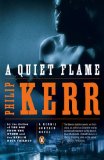Summary | Excerpt | Reviews | Beyond the Book | Readalikes | Genres & Themes | Author Bio

Critics' Opinion:
Readers' Opinion:
First Published:
Mar 2009, 400 pages
Paperback:
Feb 2010, 416 pages
 Book Reviewed by:
Book Reviewed by:
Joanne Collings
Buy This Book
“Which one?” Eichmann asked.
“How do you mean?”
“There were three pogroms,” said Eichmann. “One in 1821, one between 1881 and 1884, and a third that got started 1903. The Kishinev pogrom.”
“Ricardo knows everything about Jews,” I said. “Except how to be nice to them.”
“Oh, I should think, the most recent pogrom,” said Fuldner.
“It figures,” said Eichmann, ignoring me. “The Kishinev was the worst.”
“That’s when most of them came to Argentina, I think. There are as many as a quarter of a million Jews here in Buenos Aires. They live in three main neighborhoods, which I advise you to steer clear of. Villa Crespo along Corrientes, Belgrano, and Once. If you think you are recognized, don’t lose your head, don’t make a scene. Keep calm. Cops here are heavy-handed and none too bright. Like that chancho on the boat. If there’s any kind of trouble, they’re liable to arrest you and the Jew who thinks he’s recognized you.”
“So there’s not much chance of a pogrom here, then?” observed Eichmann.
“Lord, no,” said Fuldner.
“Thank goodness,” said Kuhlmann. “I’ve had enough of all that nonsense.”
“We haven’t had anything like that since what’s called Tragic Week. And even that was mostly political. Anarchists, you know. Back in 1919.”
“Anarchists, Bolsheviks, Jews, they’re all the same animal,” said Eichmann, who had become unusually talkative.
“Of course, during the last war, the government issued an order forbidding all Jewish immigration to Argentina. But more recently things have changed. The Americans have put pressure on Perón to soften our Jewish policy. To let them come and settle here. I wouldn’t be surprised if there were more Jews on that boat than anyone else.”
“That’s a comforting thought,” said Eichmann.
“It’s all right,” insisted Fuldner. “You’re quite safe here. Porteños don’t give a damn about what happened in Europe. Least of all to theJews. Besides, nobody believes half of what’s been in the English-languagepapers and on the newsreels.”
“Half would be quite bad enough,” I murmured. It was enough to push a stick through the spokes of a conversation I was starting to dislike. But mostly it was just Eichmann I disliked. I much preferred the other Eichmann. The one who had spent the last four weeks saying almost nothing, and keeping his loathsome opinions to himself. It was too soon to have much of an opinion about Carlos Fuldner.
From the back of his well-oiled head I judged Fuldner to be around forty. His German was fl uent but with a little soft color on the edges of the tones. To speak the language of Goethe and Schiller, you have to stick your vowels in a pencil sharpener. He liked to talk, that much was evident. He wasn’t tall and he wasn’t good-looking, but then he wasn’t short or ugly either, just ordinary, in a good suit, with good manners, and a nice manicure. I got another look at him when he pulled up at a level crossing and turned around to offer us some cigarettes. His mouth was wide and sensuous, his eyes were lazy but intelligent, and his forehead was as high as a church cupola. If you’d been casting a movie,
you’d have picked him to play a priest, or a lawyer, or maybe a hotel manager. He snapped his thumb on a Dunhill, lit his cigarette, then began telling us about himself. That was fine by me. Now that we were no longer talking about Jews, Eichmann stared out of the window and looked bored. But I’m the kind who listens politely to stories about my redeemer. After all, that’s why my mother sent me to Sunday school.
Excerpted from A Quiet Flame by Philip Kerr. Copyright © 2006 by Philip Kerr. Excerpted by permission of Putnam Books. All rights reserved. No part of this excerpt may be reproduced or reprinted without permission in writing from the publisher.





The Funeral Cryer by Wenyan Lu
Debut novelist Wenyan Lu brings us this witty yet profound story about one woman's midlife reawakening in contemporary rural China.
Your guide toexceptional books
BookBrowse seeks out and recommends the best in contemporary fiction and nonfiction—books that not only engage and entertain but also deepen our understanding of ourselves and the world around us.